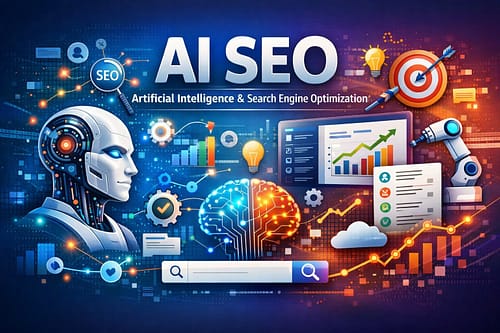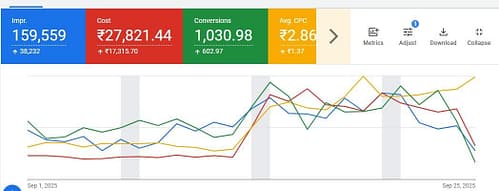Table of Contents
ToggleIntroduction: The Ongoing Debate About SEO’s Relevance
Every few years, someone confidently declares that “SEO is dead.” Whether it’s due to the rise of AI, voice search, zero-click results, or the shifting priorities of Google’s algorithm, critics are quick to assume that search engine optimization has lost its value. But here’s the reality: SEO isn’t dying—it’s evolving.
In fact, SEO has never been more critical. What’s really happening is that traditional SEO tactics are becoming obsolete, replaced by more intelligent, user-focused, and technically advanced strategies. This shift is creating a new era of SEO, one that rewards genuine expertise, structured content, and alignment with how users actually search in a multi-device, AI-powered world.
This blog will explore why SEO is not dead, how it has been upgraded, and what digital marketers must do to succeed in this new landscape.
Why “SEO Is Not Dead” — It’s More Alive Than Ever
Let’s start with the numbers. Over 90% of online experiences still begin with a search engine, and Google processes over 8.5 billion searches per day. Businesses continue to see one of the highest ROIs from organic search, and SEO remains a pillar of digital marketing across every industry.
Google itself invests billions into refining its algorithm—releasing thousands of changes annually. If SEO were truly dead, why would Google keep improving how it ranks and displays content?
The truth is: SEO is very much alive. But it’s no longer about “tricking” the algorithm. It’s about aligning with it—and more importantly, aligning with user intent.
The Evolution: From Old SEO to the New Era of SEO
To understand where we are now, we must understand where we’ve come from.
Old SEO was built on tactics like keyword stuffing, mass link-building, and metadata manipulation. While they worked a decade ago, they’re now either ineffective or penalized.
In contrast, new SEO is smarter, broader, and more integrated:
It’s about semantic search—understanding the context behind a query, not just matching words.
It prioritizes user experience, site speed, mobile optimization, and accessibility.
It rewards expertise, authority, and trust—especially in YMYL (Your Money, Your Life) niches.
We’re also seeing the rise of AEO (Answer Engine Optimization) and GEO (Generative Engine Optimization)—two concepts that reflect the massive shift in how search is delivered.
Write for SEOBABABOLA Free Guest Post Opportunity!
Are you passionate about digital marketing, SEO, PPC, or content strategy? I’m now accepting free guest post submissions on SEOBABABOLA.COM!
This is a great chance to:
✅ Share your expertise with a growing audience
✅ Build your personal brand and authority
✅ Get a do-follow backlink to your website or portfolio
✅ Connect with like-minded marketers and business owners
Topics Nikhil Sharma love
SEO, Google Ads, Facebook Ads, Content Marketing, Blogging Tips, AI Tools, Analytics, and more!
📝 Submission Guidelines:
Original and high-quality content (no AI-generated junk)
Minimum 800 words
Include a short author bio with a link
No spammy links or promotional content
💡 Ready to contribute?
Send your topic ideas or full post to WhatsApp or reach out via the Contact Page.
Let’s grow together 🚀
What No Longer Works: Outdated SEO Tactics to Retire
If you’re still clinging to tactics from the early 2010s, you’re not just behind—you’re at risk.
Here’s what needs to go:
Keyword stuffing: Modern algorithms understand context. Repetition triggers penalties, not rankings.
Spammy backlinks: Google’s Penguin update made low-quality links toxic.
Thin content: A few hundred words won’t rank anymore, especially in competitive spaces.
Exact-match domains and anchor text abuse: Over-optimization is now a red flag.
Automated content spinning: AI has made quality expectations even higher.
The bottom line? Google doesn’t want manipulated content. It wants helpful content.
What Works Today: Upgraded SEO Strategies
Modern SEO is about delivering real value to real users. Here’s what works in today’s environment:
➤ Topical Authority & Semantic SEO
Cover a subject thoroughly across multiple interlinked pages to become a trusted source in your niche. Think of SEO in terms of topics, not just keywords.
➤ E-E-A-T (Experience, Expertise, Authoritativeness, Trustworthiness)
Create content that reflects firsthand experience, expert knowledge, and a clear, trustworthy voice. Include bios, cite credible sources, and write as a real practitioner.
➤ Structured Data & Schema
Implement structured data to help Google better understand and index your content. Rich snippets can increase visibility and click-through rates.
➤ Zero-Click & Featured Snippets Optimization
Use concise, well-structured answers within your content to capture People Also Ask and featured snippets.
➤ Advanced Tools & Data-Backed Strategy
Use tools like SurferSEO, Ahrefs, Google Search Console, Semrush, and AlsoAsked to find content gaps, optimize keyword placement, and analyze SERP behavior.
AEO & GEO: Optimizing for the Future of Search
The future of search is conversational, AI-powered, and context-aware.
AEO: Answer Engine Optimization
Instead of delivering a list of links, Google is increasingly offering direct answers. To win in this landscape:
Use clear, structured answers with H2/H3 subheadings
Write in a Q&A format for FAQ-rich sections
Include authoritative citations and clear language
GEO: Generative Engine Optimization
As platforms like Google’s SGE and Bing’s AI Copilot become more integrated into user workflows, GEO focuses on how your content is chosen by AI assistants to answer user queries.
Focus on conversational clarity
Use natural language and long-tail keyword phrases
Build credibility signals like author bios, brand mentions, and backlinks
This is where content written by true experts (not AI spam) will dominate.
The Business Perspective: Why Brands Can’t Ignore SEO
For business owners and marketers, modern SEO offers long-term sustainability.
Unlike paid ads, which stop the moment your budget does, SEO compounds over time. It builds digital assets that generate consistent traffic, leads, and revenue.
At MWN Corporation, we’ve helped local businesses reduce CPA by 40% and double lead flow within 6 months of an SEO-centric strategy overhaul. These results aren’t an anomaly—they’re what happens when you stop chasing hacks and start building strategic, intent-aligned content systems.
Q1. Is SEO still relevant in 2025?
Absolutely. SEO continues to drive massive ROI for businesses. It has evolved beyond keywords and now includes user intent, authority, and structured data optimization.
Q2. What is the difference between old SEO and new SEO?
Old SEO focused on tactics like keyword stuffing and backlinks. New SEO emphasizes topical authority, user experience, structured content, and alignment with search intent.
Q3. What is AEO in SEO?
AEO stands for Answer Engine Optimization. It’s the practice of formatting content so that it ranks in featured snippets, People Also Ask, and voice search results.
Q4. What is GEO and how does it affect SEO?
GEO, or Generative Engine Optimization, involves optimizing content to appear in AI-generated search responses—like Google SGE or Bing’s AI chat. It focuses on clarity, authority, and trust.
Q5. Why do people say SEO is dead?
Misconceptions arise when outdated SEO tactics stop working. But SEO itself is thriving—it’s just more sophisticated, user-focused, and integrated with AI technologies.
Interested in Working with Us?
If you’re looking for dedicated experts to help grow your business through effective SEO and PPC strategies, you’re just one click away. At MWN CORPORATION, we tailor our approach to fit your unique needs, ensuring every campaign drives real results. Let’s work together to achieve your marketing goals with clarity and confidence.

Final Thoughts: SEO Isn’t Dead, It’s Simply Smarter Now
SEO has survived mobile revolutions, algorithm storms, and now the rise of generative AI. What’s dying isn’t SEO—it’s outdated thinking. The new SEO is about understanding your users, aligning with modern search engines, and becoming the best source of answers in your niche. That requires depth, data, and discipline—not shortcuts. And in this new era, marketers who adapt will thrive.







1 Comment
[…] Final Thoughts: Why Every Business Needs SEO […]